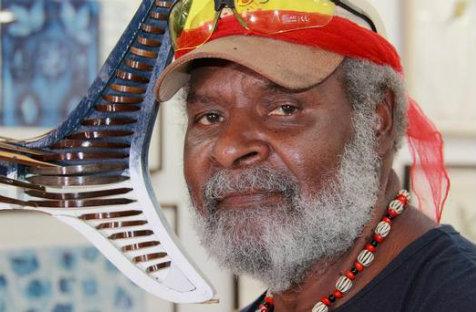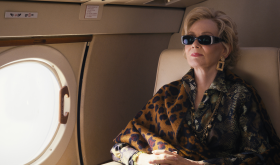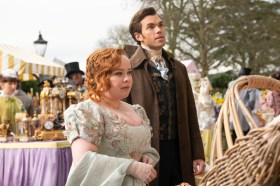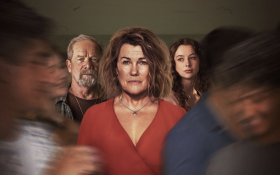The free Blak Nite Cinema program returns in 2013, exploring Aboriginal and Torres Strait islander culture – visual arts, hip hop and country music, traditional and contemporary dance, theatre and the performing arts – through film. Here are some of the many highlights from the film program.
Blood Brothers: From Little Things Big Things Grow
With its title taken from the protest anthem of the same name – first recorded by Paul Kelly and The Messengers in 1991, then by Kev Carmody with Kelly in 1993 – the subject of Blood Brothers: From Little Things Big Things Grow is immediately apparent, as is its vintage. Produced and released on Australian television 20 years ago, the documentary nonetheless remains striking, pertinent and educational as it examines Carmody’s upbringing, outlook and prolific output as a singer/songwriter. The Trevor Graham-written and produced episode of the Blood Brothers series examines the influence of a rural South East Queensland upbringing on Carmody’s life and music though television clips, archival photographs of his family, music videos from his acclaimed albums, and interviews with Paul Kelly and Billy Bragg, as well as numerous pieces to camera. The essence of the feature, however, is Carmody’s inimitable, humble insights into his heritage and culture, and a wellspring of creativity which stems from holding a mirror up to the social wrongdoings of his beloved nation.
Buried Country
The distinct voice of Kev Carmody returns in Buried Country, again delving into the history and music of Aboriginal Australia. Here, however, Carmody’s own efforts are not the focus of the documentary; nor are the songs featured of a political nature; instead, his familiar tones are used to narrate an exploration of Indigenous country music based on the appropriately-titled book Buried Country: The Story of Aboriginal Country Music by Clint Walker. Commencing with Jimmy Little’s ascension to fame via his 1963 appearance on Bandstand, and charting the evolution of the genre in the decades that followed, the documentary paints a concise yet compelling picture of Aboriginal country music performers, including boxer turned crooner Lionel Rose, Alice Springs songstress Auriel Andrew, and Golden Guitar winner Troy Cassar-Daley. Through informative interviews with figures involved in the genesis and acceptance of Aboriginal country music performers – Australian legend Slim Dusty among them – director Andy Nehl engages and entertains in his chronicle of a genre more commonly associated with non-Indigenous singers, but embraced by all for its ability to relate stories of living on the land, love of one’s country, and changing social conditions.
7 Colours
7 Colours commences with an apt quote from Johann Wolfgang von Goethe: ‘Each individual colour makes on men, an impression of its own, and thereby reveals its nature to the eye as well as the mind.’ The 30-minute dance piece that follows puts the German artist, writer and politician’s theory into practice, as dancers use freeform movement to convey the emotion of the seven colours of the title. Expressive and immersive, the performance impresses in its intricacy, with the talent changing with the colour transition (red, orange, yellow, green, blue, purple and black among them). Writer and director John Michael Rogowski is careful in his composition; however it is the choreography of Stephen Page (from the company then known as the Aboriginal Island Dance Theatre) and Victoria Taylor (from the Sydney Dance Company) which triumphs in the collage of kaleidoscopic colours, psychedelic lighting and fluid human movement.
Ken Thaiday Senior – The Sea, the Feather and the Dance Machine
In the remote region of Erub in the Torres Strait, Ken Thaiday Senior turned his traditional upbringing into an expression of creativity and cultural identity. Now renowned as Australia’s most senior Torres Strait Islander artist, his work with mobilised artefacts has garnered international acclaim, yet each piece stems from personal experience, namely his instruction in the ceremonial ways of his ancestors. Ken Thaiday Senior – The Sea, the Feather and the Dance Machine explores one of his most important and inventive works, another of the shark headdresses for which he has solidified his creative reputation. Observational and contemplative in approach, the film allows Thaiday to lead the audience through his process and inspiration, from the lapping of the waves at his island home to the painstaking detail involved in bringing his elaborate creations to life.
Alick Tipoti: Zugab, the Mask, the Spirits and the Stars
Filmed on Badu Island and Cairns in North Queensland, Alick Tipoti: Zugab, the Mask, the Spirits and the Stars is not only immersed in the content created by the titular visual artist, but its context, too – the legends of the land that inform them, the cultural protocols that dictate their details, and the strong sense of history inherent in each piece. Guided by Tipoti’s interviews to camera, the film also examines the exacting production process required for his complex carvings of traditional Torres Strait Island designs, with each etched into linoleum and vinyl before being transferred to paper. His experiences and outlook is paramount, shaping his artistry but also influencing the reflective, resonant mood of the feature. A poignant snapshot of the interweaving of life and art, the documentary is candid and considered, infused with Tipoti’s visual prowess as well as his musical and choreographic output.
City of Melbourne present
Blak Night Cinema
Australian Centre for the Moving Image 8 – 10 February
Actors:
Director:
Format:
Country:
Release:





